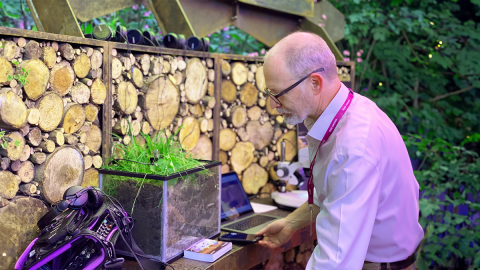BAKER CONSULTANTS WINS MAJOR ECOACOUSTIC RESEARCH GRANT FROM DEFRA UNDER THE FARMING INNOVATION PROGRAMME

The grant will see Baker Consultants work alongside soil scientists from University of Warwick on a 2-year eco-acoustic research project
Baker Consultants Ltd. has been awarded £250,000 DEFRA grant to undertake a two-year research project investigating the feasibility of using ecoacoustics for monitoring soil health. The grant has been awarded under Feasibility Round Two of the Farming Innovation Programme, which is being delivered by Innovate UK. The grant assessors were particularly impressed with the level of innovation the approach provides and the commercial potential it offers, which was developed by the company’s Director of Bioacoustics, Dr. Carlos Abrahams.
When evaluating the grant application, one of the assessors remarked “This is truly innovative, and has been recognised as such by the industry. If successful, this solution will significantly improve on-farm data collection on soil health, supporting farmers as they implement actions which will improve their resilience, sustainability and productivity. The approach is clearly defined, as are the outputs.”
The aim of the project is to develop a system for monitoring the activity of earthworms, soil fauna in agricultural settings and other soils using bioacoustics. The study will analyse recordings of natural soil sounds at 'big data' scales, with the aim of developing ways to process it rapidly to distinguish species or functional groups of animals.
Baker Consultants is the lead organisation on the project and will be working in partnership with the University of Warwick Crop Centre as the academic partner. The Baker Consultants team is led by Dr. Carlos Abrahams, an authority in ecoacoustics. Carlos will work closely with Dr. Jacqueline Stroud from University of Warwick, who has undertaken considerable research in soil security and the use of earthworms as bioindicators.
Soil health is fundamental to crop production and the maintenance of soils is vital to global food security. Earthworms are critically important for maintaining soil health across all outdoor cropping systems, helping maintain sustainable crop production. They are also important as a food resource for many species within the food chain. At present, farmers assess the numbers and diversity of earthworms by digging sample pits and then extracting the worms from within. However, this is labour intensive and costs time and money. Farmers across the UK, and the world, have repeatedly expressed their need for a more efficient system for measuring earthworm communities.
In pilot studies, the ecoacoustics team at Baker Consultants has shown that it is possible to record the acoustic signatures of organisms within the soil, which could then be used for biodiversity monitoring, including earthworm abundance and activity. This technique will have substantial benefits for soil monitoring, as acoustic measurements can generate results in minutes, rather than the current manual methods. Farmers would place probes within the soil and record the sound output; this would then be analysed by algorithms that compare the output to a sound library to identify the abundance, diversity and activity levels of soil fauna present.
Jacqueline Stroud, Assistant Professor of Soil Science at University of Warwick, said “We have already had great support from our farming community who have donated buckets of model soils and earthworms so that we can start to make precise measurements in the laboratory. There’s a real sense of excitement as discoveries are made every day. Earthworms make rasping sounds and rhythmic scrunching as they move through the soil which we can use to detect them. I’m hopeful that getting this technology into the hands of the agriculture industry will help to ensure that human activities limit their impact upon biodiversity.”
Baker Consultants has developed a Soil Acoustic Meter (patent pending) and ecoacoustic databases, which data collected in the field can be compared and benchmarked against. This new service will offer a rapid and inexpensive method for assessing and measuring soil health over time. The ecoacoustics team will also be using advanced AI to deliver rapid sample analysis and reporting. This approach can be scaled up to be applied anywhere in the world and it offers exciting opportunities across many sectors, including the monitoring of habitat enhancement and restoration projects including Biodiversity Net Gain and rewilding.
Andrew Baker, Founder and Managing Director of Baker Consultants, said ‘We have already begun work on this project and all the data we have collected so far supports our basic hypothesis that a noisy soil is a healthy soil. This grant will allow us to deepen the scientific evidence behind our approach and to develop a cutting-edge soil monitoring service that promises to be a major disrupter in the soil testing market.’
The overall aims of this project are to:
- Develop a prototype to rapidly record soil ecoacoustic data.
- Develop a detailed library of acoustic signatures from earthworms and other macroinvertebrates in controlled experiments.
- Record the soil soundscapes in different geographies and under varying land management practices, relating these to earthworm distribution.
- Construct a large database of soil sound across a wide variety of soil types throughout the UK, against which soil acoustic data can be analysed & benchmarked.
You can find out more about Baker Consultants’ research in the field of soil acoustics here: https://bakerconsultants.co.uk/news/soil-ecoacoustics-the-sound-of-restored-soil/
